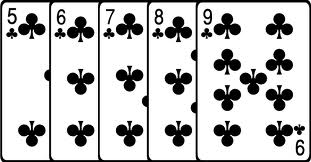Poker Calculator (five card)
Tags | |
UUID | a739b384-bd2d-11e3-9cd9-bc764e2038f2 |
The Poker Calculator (five cards) provides all the equations, the calculations, to determine the probabilities of success and failure when playing Poker with a standard five card deck. See the Notes Page for an explanation of how to apply all the probabilities.
This calculator provides the probabilities (fixed) for drawing each kind of hand in Poker: pairs, three of a kind, straight, flush, full house, four of a kind, straight flush, and royal flush. It also provides the probabilities of your specific hand being beaten; eg, the probability of you having three of a kind with Ace high and losing (based on your specific cards.
If you get rich using this calculator, you owe me dinner!
Notes:
This calculator can help you make decisions and determine the probabilities of success and failure in the game of poker using a standard 52 card deck.
Probability of Hands:
The Calculator tab labeled Probability of Hands identifies the probability of each kind of five card poker hand. This is useful knowledge as the difference in probabilities for different hands can be used in your betting strategy. For instance if the game you're playing has your opponent's cards reveled as part of the game play, his chances of turning those revealed cards into a full house can be compared to you chances of having a higher full-house than the one his revealed cards might suggest. You can see that the your opponent's probability of being dealt a Full House is approximately 0.144%. So, you look at other equations in this calculator to see what are the odds of you next card giving you a better hand.
We provide two versions of these probability constants, one which is expressed as a percentage and one which is expressed as a fraction.
The probability of the Full House for instance is 0.14405762% vice the fraction 0.00144058. It is assumed the percentage is easier to use in thinking strategy. vCalc's calculators can combine equations in algebraic combinations so the fraction version of the hand probabilities can be used in performing more complex calculations if you like.
Probability of Losing:
The calculator tab labeled Probability of Losing provides a set of buttons for equations that take your specific hand and tells you what the probability is that an opponent has a better hand than you.
Utility:
You can compare the relative probability of two possible hands to see if there is enough savings in risk to chance taking new cards vice holding the cards dealt. You can also compare your probability of getting a specific hand (see Probability of Hands above) to the probability of losing with that hand. For example, the probability of being dealt a full house is 0.144%, while the probability of losing a hand that is a full house of three 9's and two 10' is: 0.125%.
Equations and Data Items
- Comments
- Attachments
- Stats
Cool Calculator. I need to get this on my phone. What is the probability of winning with a High card? |
